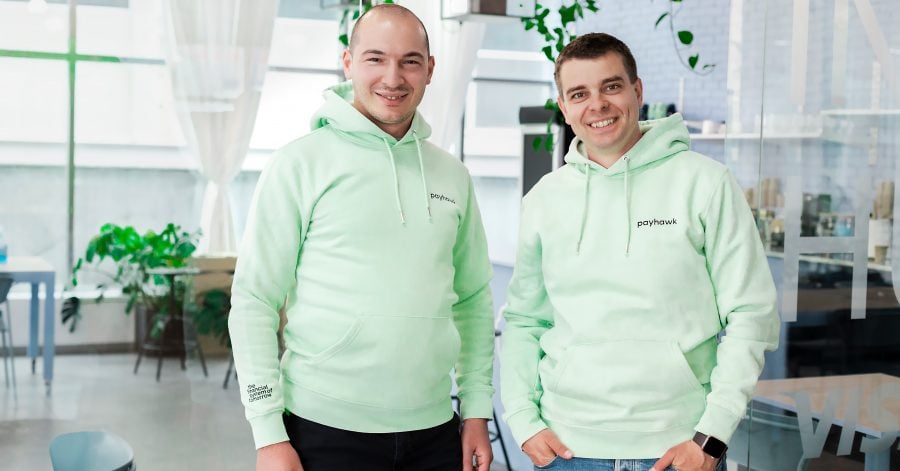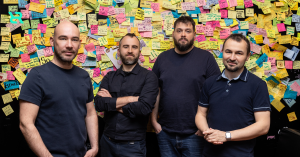About 3 years after it was founded in Sofia, fintech startup Payhawk has managed to attract $20M in Series A funding – the biggest round ever for a Bulgarian venture at this stage and one of the largest in Southeast Europe. The lead backer is QED Investors, a US-based fund with 18 fintech unicorns in its portfolio, including the currently valued at $31B Klarna. Previous investor Earlybird Digital East, who led Payhawk’s previous $3.6M seed round back in March 2020, has also contributed more capital.
The new funding will be used for further expansion of Payhawk’s payment and expense management product and tripling of the company’s marketing and sales team, with plans for increased presence in the UK, Germany, and Spain. The US is also on the cards as a next market but before moving there Payhawk will first focus on European-based enterprises with teams overseas.
Payhawk founder and CEO Hristo Borisov shared in front of The Recursive that around 20 new people will be hired in Sofia, stating an ambition to attract Bulgarians who live abroad back to the country.
On a unicorn trajectory?
According to estimates by The Recursive based on various external sources, this deal puts Payhawk’s valuation at $80M.
“We are delighted to invest in Payhawk. The company is growing at a phenomenal rate. The company’s product fundamentals are exceptionally strong, and industry trends are working in the company’s favour too. As budgets are more typically managed online by remote teams, there is unprecedented demand for cost-effective finance solutions,” explains Yusuf Ozdalga, partner at QED Investors, who will join the Payhawk’s board alongside previous investors Mehmed Atici, partner at Earlybird Digital East and Vassil Terziev, managing partner at Bulgarian Eleven Ventures.
Payhawk announced a 10x growth of Monthly Recurring Revenue (MRR) in 2020 and further doubling in Q1 of 2021.
Together with nanosat startup EnduroSat, which recently raised $2.4M at a reported valuation of nearly $60M, Payhawk appears to be in a good position to become the first Bulgarian unicorn. Another candidate is OKR-focused Gtmhub, which raised a $30M Series B earlier this year. (For the purposes of this comparison, we are considering only companies that have been founded in Bulgaria, have at least one Bulgarian founder, and early-stage capital provided by a local investor).
Looking at the Series A rounds of various fintech unicorns on Crunchbase and Craft, we can observe the following (keep in mind that funding rounds have increased in size in recent years, so Series A in 2021 cannot be directly put against Series A from 2011):
| Company name | Series A round | Year |
| Payhawk | $20M | 2021 |
| Revolut | $8.7M | 2016 |
| Stripe | $18M | 2012 |
| Transferwise (Wise) | $6M | 2013 |
| Klarna | $2.2M | 2007 |
| Coinbase | $6.1M | 2013 |
| N26 | $12M | 2015 |
| Nubank | $14.3M | 2014 |
| Adyen | $16M | 2011 |
Payhawk: One-stop-shop for payment and expense management
As explained by Payhwawk, many financial teams today rely on traditional banking to manage their corporate expenses. This limits the access to company cards for employees due to poor control, and employees often have to pay and wait for months to recover their own funds.
In practice, Payhawk fills the gap between traditional banks and accounting systems. As a result, the fintech startup enables finance teams to provide company cards to their employees, avoid manual processing of expenses, control budgets in real-time, and fully automate payment and expense approvals regardless of the payment method. With the new funding, Payhawk also plans to accelerate its use of machine learning, in order to introduce smart workflows, and further reduce the need for manual review and approval.
“We have huge ambitions for the year ahead. Over the next year, we are keen to provide great support to finance teams across 30+ countries to manage company cards, invoices, and payments in a unified and efficient way. We plan to significantly expand our integrations to existing ERP systems, and also easily connect on top of every business bank account across Europe and beyond. To do this, we need to invest in building the right setup and team to scale further, and the new funding round will enable us to do this,” says Borisov in an official statement.








